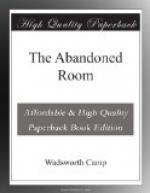“Bobby was my friend,” the Panamanian answered. “He had been very good to me. When I read of his grandfather’s death I wondered why Maria had drugged him to keep him in New York. In the coincidence lurked an element of trouble for him. At first I suspected some kind of an understanding between her and old Blackburn—perhaps she had engaged to keep Bobby away from the Cedars until the new will had been made. But here was Blackburn murdered, and it was manifest she hadn’t tried to throw suspicion on Bobby, and the points that made Howells’s case incomplete assured me of his innocence. Who, then, had killed his grandfather? Not Maria, for I had dropped her at her apartment that night too late for her to get out here by the hour of the murder. Still, as you suspected, Maria was the key, and I began to speculate about her.
“She had told me something of her history. You might have had as much from her press agent. Although she had lived in Spain since she was a child, she was born in Panama, my own country, of a Spanish mother and an American father. Right away I wondered if Blackburn had ever been in Panama or Spain. I began to seek the inception of the possible understanding between them. Since I found no illuminating documents about Blackburn’s past in the library, I concluded, if such papers existed, they would be locked up in the desk in his room. I searched there a number of times, giving you every excuse I could think of to get upstairs. The other night, after I had suspected her of knowing something, Miss Katherine nearly caught me. But I found what I wanted—a carefully hidden packet of accounts and letters and newspaper clippings. They’re at your service, Mr. District Attorney. They told me that Silas Blackburn had been in Panama. They proved that Maria, instead of ever having been his accomplice, was his enemy. They explained the source of his wealth and the foundation of that enmity. Certainly you remember the doctor told us Silas Blackburn started life with nothing; and hadn’t you ever wondered why with all his money he buried himself in this lonely hole?”
“He returned from South America, rich, more than twenty-five years ago,” the doctor said. “Why should we bother about his money?”
“I wish you had bothered about several things besides your ghosts,” Paredes said. “You’d have found it significant that Blackburn laid the foundation of his fortune in Panama during the hideous scandals of the old French canal company. We knew he was a selfish tyrant. That discovery showed me how selfish, how merciless he was, for to succeed in Panama during those days required an utter contempt for all the standards of law and decency. The men who got along held life cheaper than a handful of coppers. That’s what I meant when I walked around the hall talking of the ghosts of Panama. For I was beginning to see. Silas Blackburn’s fear, his trip to Smithtown, were the first indications of the presence of the other Blackburn. The papers outlined him more clearly. Why had it been forgotten here, Doctor, that Silas Blackburn had a brother—his partner in those wretched and profitable contract scandals?”




